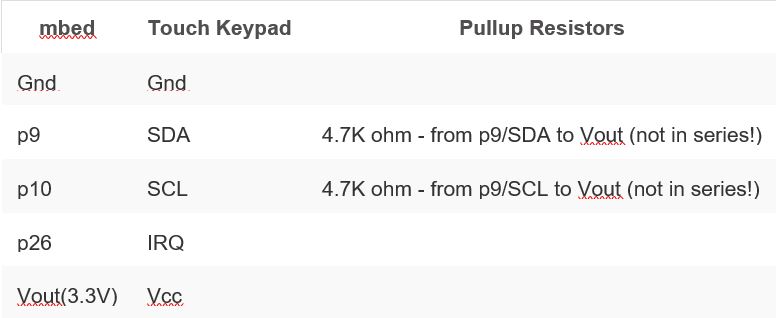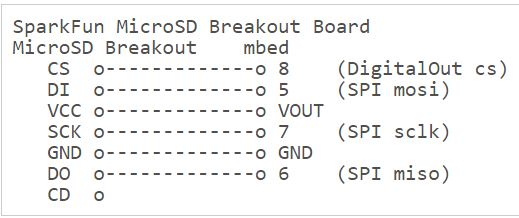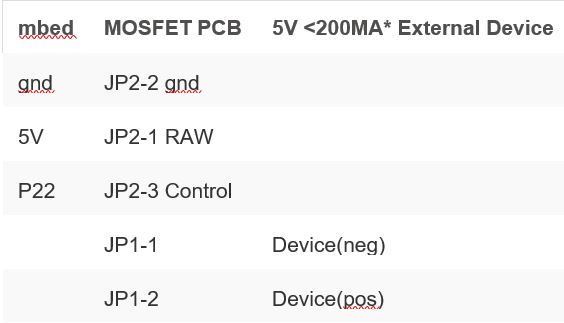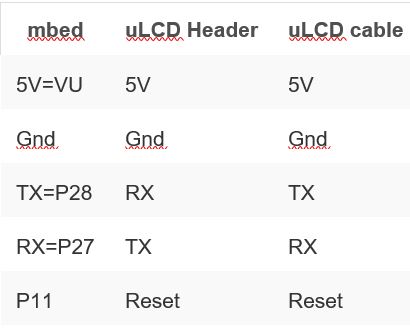Memory Game
This project is a memory game incorporating a keypad, a speaker (and amp) playing audio off an SD card. This games tests your memory in rounds until you can't remember anymore.





include the mbed library with this snippet
#include <mbed.h>
#include <mpr121.h>
#include <vector>
#include "uLCD_4DGL.h"
#include "SDFileSystem.h"
#include "wave_player.h"
//#include "Speaker.h"
AnalogOut DACout(p18);
wave_player waver(&DACout);
SDFileSystem sd(p5, p6, p7, p8, "sd");
Serial pc(USBTX,USBRX);
PwmOut motr(p22);
// Create the interrupt receiver object on pin 26
InterruptIn interrupt(p26);
// Setup the i2c bus on pins 9 and 10
I2C i2c(p9, p10);
// Setup the Mpr121:
// constructor(i2c object, i2c address of the mpr121)
Mpr121 mpr121(&i2c, Mpr121::ADD_VSS);
uLCD_4DGL uLCD(p9,p10,p11);
// Key hit/release interrupt routine
vector<int> plyr;
void fallInterrupt() {
motr.period(0.0020);
motr.write(1);
wait(0.05);
double value = mpr121.read(0x00);
value += mpr121.read(0x01)<<8;
value = log(value)/log(2.0);
motr.period(0.0020);
if (value < -12.0 || value > 12){
value = -1.0;
}
if (value >= 0){
plyr.push_back(value);
}
motr.write(0);
}
int main() {
interrupt.fall(&fallInterrupt);
interrupt.mode(PullUp);
srand(time(0));
bool live = true;
vector< int > comp;
int rnd = 1;
int iRand = 0;
while (live) {
plyr.clear();
//pc.printf("player array: %i\n\r",plyr.size());
//wait(5);
iRand = rand() % 10;
pc.printf("Round %i\n\r",rnd);
uLCD.cls();
uLCD.locate(5,0);
uLCD.printf("Round %i\n\r",rnd);
comp.push_back(iRand);
wait(5);
pc.printf("Try and remember this: \n\r");
uLCD.locate(0,5);
uLCD.printf("Try and remember this:");
for (int disp = 0; disp < comp.size(); disp++){
pc.printf("%i",comp[disp]);
uLCD.printf("%i",comp[disp]);
}
pc.printf(" \n\r");
wait(5);
pc.printf("What was the sequence?\n\r");
uLCD.cls();
uLCD.locate(0,0);
uLCD.printf("What was the sequence?\n\r");
wait(10);
pc.printf("You entered: \n\r");
uLCD.cls();
uLCD.locate(0,0);
uLCD.printf("You entered: \n\r");
uLCD.locate(0,5);
for (int disp = 0; disp < plyr.size(); disp++){
pc.printf("%i",plyr[disp]);
uLCD.printf("%i",plyr[disp]);
}
wait(5);
pc.printf(" \n\r");
wait(5);
//pc.printf("Size: %i\n\r",plyr.size());
//wait(5);
if(plyr.size()==comp.size())
{
for(int indx = 0; indx < comp.size(); indx++){
if (comp[indx]!= plyr[indx]){
uLCD.cls();
uLCD.locate(5,0);
uLCD.printf("Game Ended!\n\n\r");
pc.printf("Game Ended!\n\r");
live = false;
uLCD.printf("Your Score: %d \n" , rnd-1 );
pc.printf("Your Score: %d \n" , rnd-1 );
break;
}
}
rnd++;
}
else {
uLCD.cls();
uLCD.locate(5,0);
uLCD.printf("Game Ended!\n\n\r");
uLCD.printf("Your Score: %d \n" , rnd-1);
pc.printf("Game Ended!\n\r");
pc.printf("Your Score: %d \n" , rnd-1 );
live = false;
{{/media/uploads/Osherif/ulcd.jpg}} }
}
FILE *wave_file = fopen("/sd/eyes.wav", "r");
waver.play(wave_file); //Plays *.wav audio file
fclose(wave_file);
}
Please log in to post comments.
